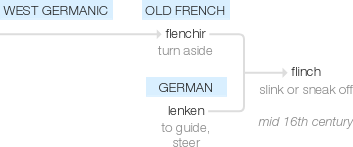Flinch
mid 16th century (in the sense ‘slink or sneak off’): from Old French flenchir ‘turn aside’, of West Germanic origin and related to German lenken ‘to guide, steer’.
wiktionary
From Middle French flenchir(“to bend”), of Germanic origin. Compare Middle High German lenken(“to bend”). Attested in English since the 16th century.
flinch (third-person singular simple present flinches, present participle flinching, simple past and past participle flinched)
etymonline
flinch (v.)
1570s, apparently a nasalized form of obsolete Middle English flecche "to bend, flinch," which probably is from Old French flechir "to bend" (Modern French fléchir), also flechier "to bend, turn aside, flinch," which probably are from Frankish *hlankjan or some other Germanic source, from Proto-Germanic *hlinc- (source also of Middle High German linken, German lenken "to bend, turn, lead"), from PIE root *kleng- "to bend, turn" (see link (n.)). There were nasalized form of the word in Old French as well (flenchir "to bend; give ground, retreat"). Related: Flinched; flinching. As a noun, "the action of flinching," from 1817.
